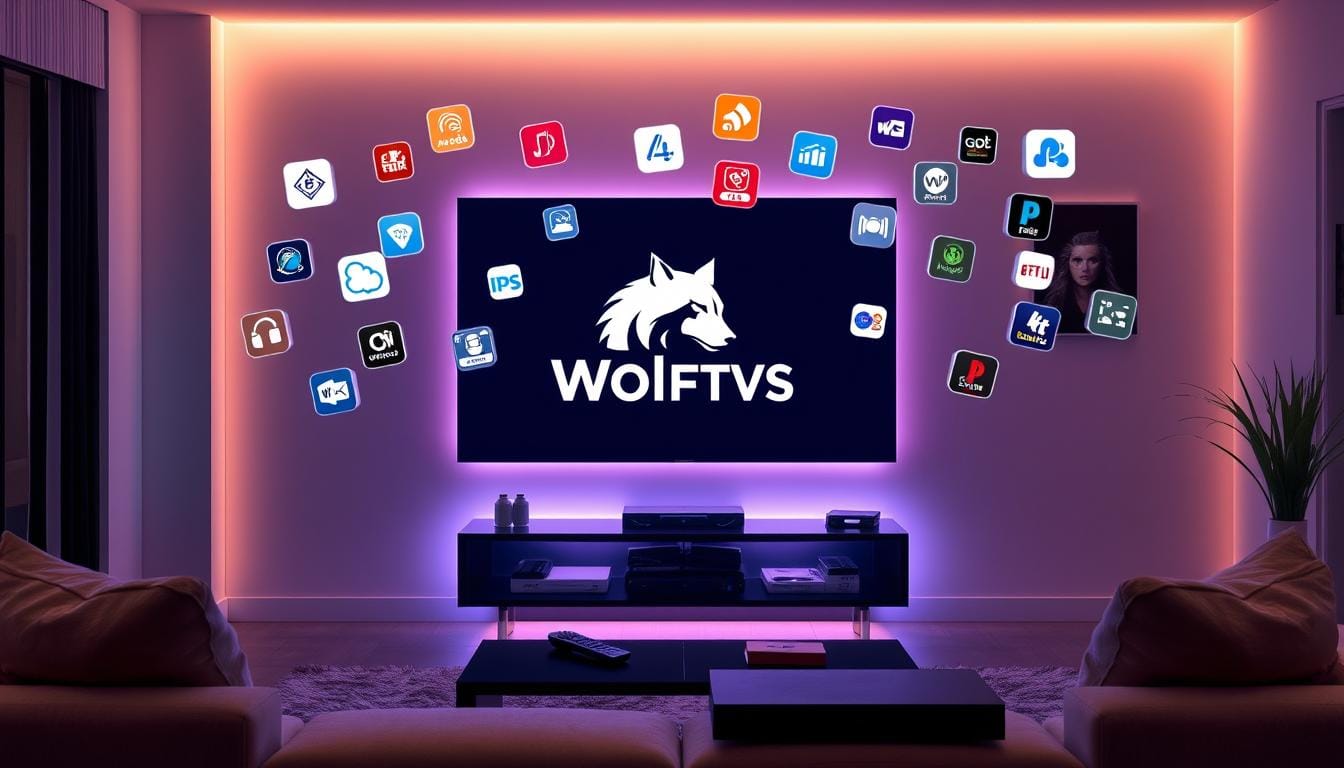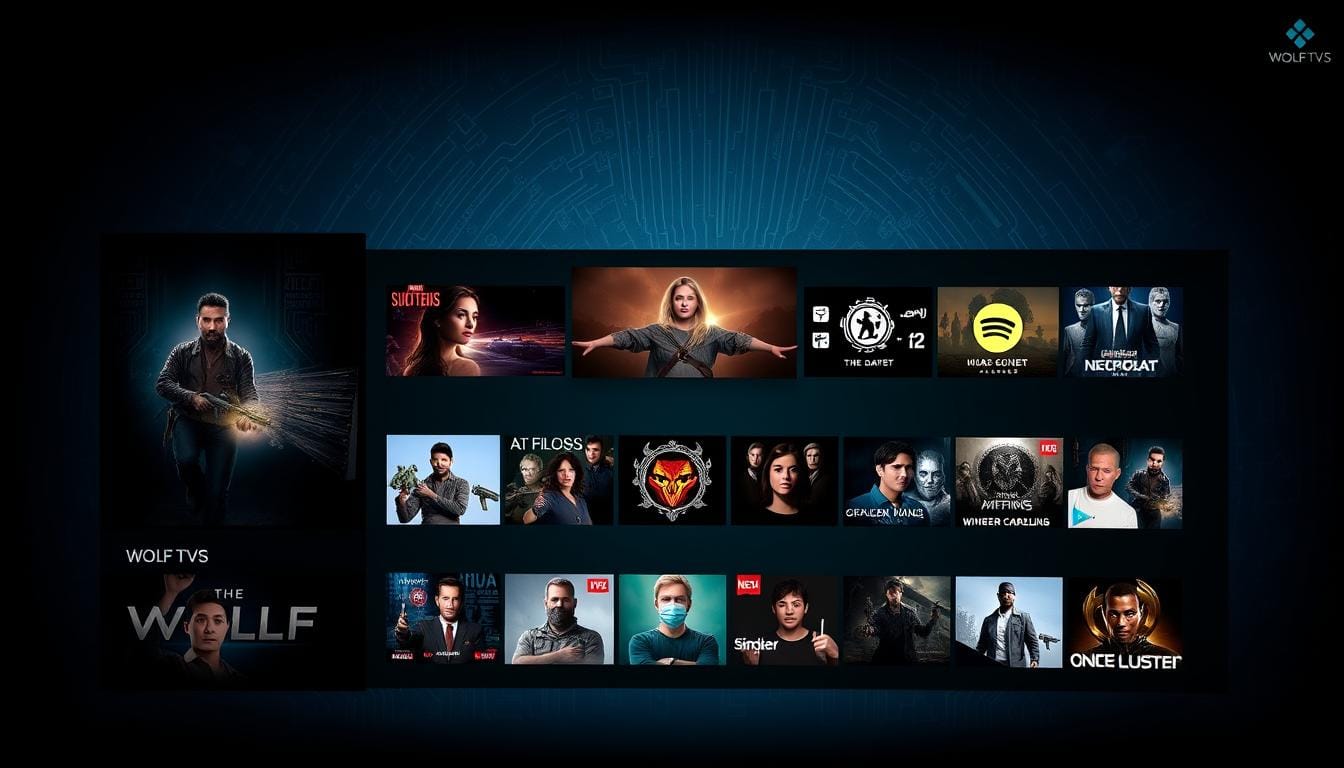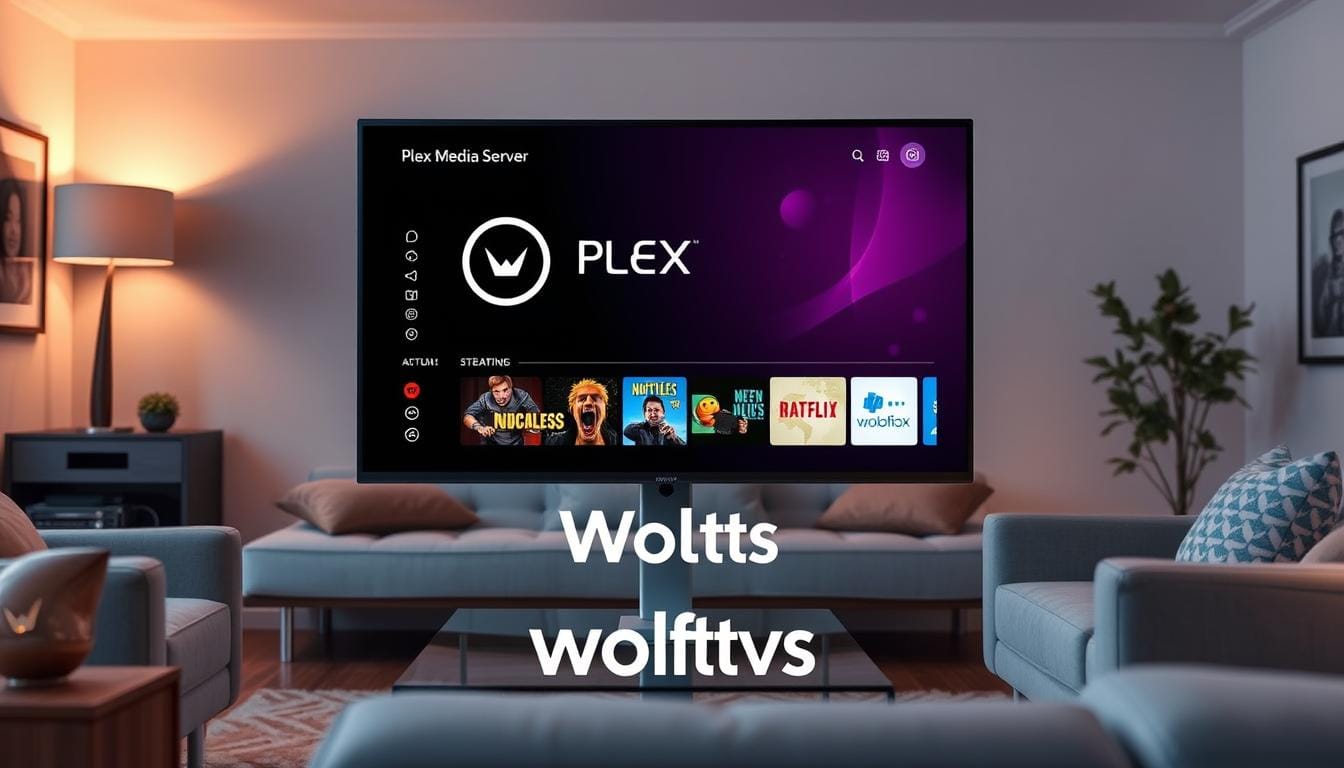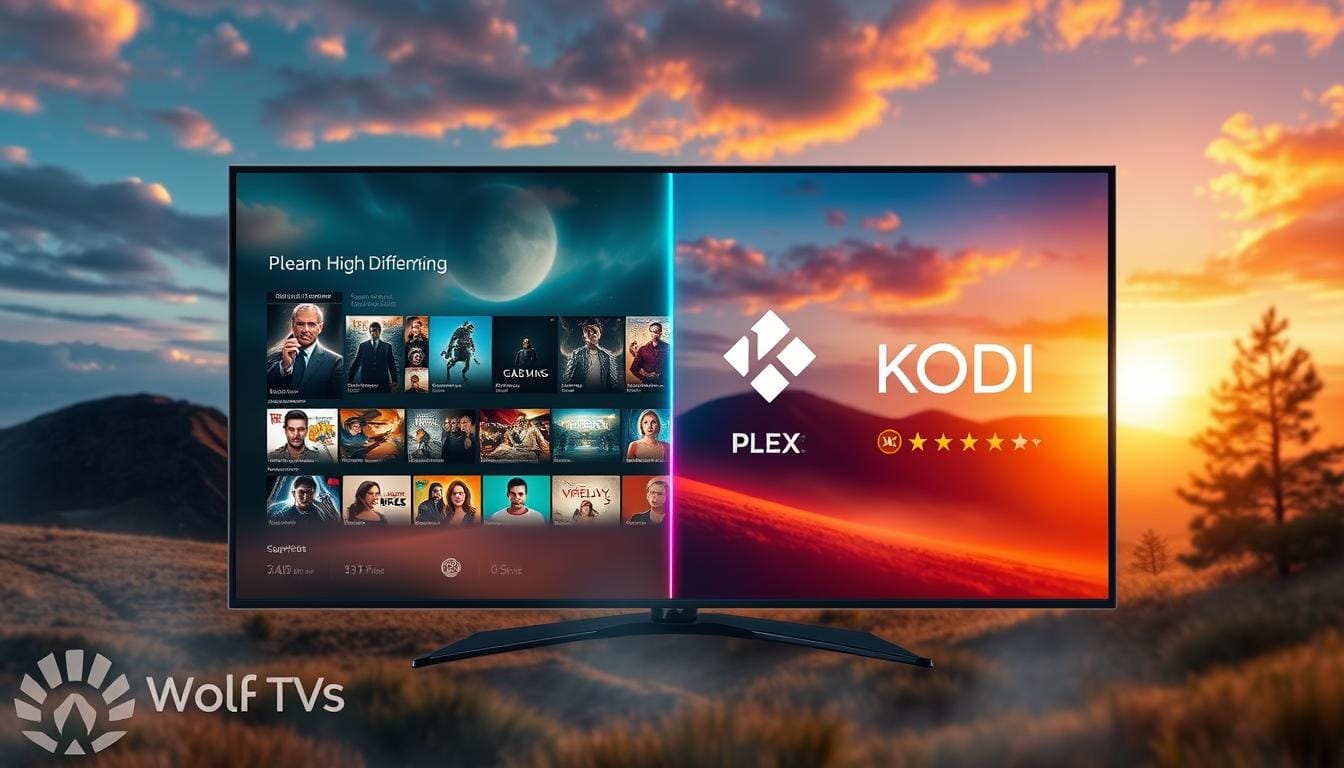Plex vs Kodi for IPTV: Streaming Platform Comparison

Table of Contents
I love movies, TV shows, and live entertainment. Finding the right streaming platform is a big challenge. Plex vs Kodi for IPTV are two top choices fans. We’ll compare them in detail, covering their features, content, setup, and user experiences.
This comparison aims to help you choose the best streaming platform for you. Get ready for a deep dive into Plex and Kodi.
Get in Touch on WhatsApp or Telegram to Subscribe and Unlock endless IPTV Entertainment!
Key Takeaways
- Plex and Kodi are leading media center software solutions for IPTV streaming, each with unique features and capabilities.
- Plex focuses on media organization and remote access, while Kodi offers a more customizable and open-source experience.
- Both platforms provide access to a vast library of live TV channels and on-demand content, with Plex’s catalog reaching over 50,000 titles.
- Plex is compatible with a wide range of devices, including gaming consoles and smart home platforms, making it a versatile choice.
- Kodi’s open-source nature allows for extensive customization and a rich ecosystem of third-party addons, catering to advanced users.
Introduction to IPTV and Streaming Platforms
The way we watch TV has changed a lot. IPTV, or Internet Protocol Television, brings TV to your internet connection. This means no more cable or satellite tuners needed. Now, you can watch lots of live TV and on-demand content on your devices.
What is IPTV?
IPTV uses the Internet to send TV shows and movies to your devices. It’s different from old TV because it uses the internet to stream high-quality video and sound. This makes watching TV easy and flexible.
Popularity of IPTV Services
IPTV is getting more popular because it’s flexible and has lots of content. You can watch it on many devices, like smart TVs and phones. This lets you watch your favorite shows anytime, anywhere.
Also, IPTV is affordable and easy to get. You can find free options like Kodi or pay as little as $9.95 a month. This makes IPTV great for all kinds of budgets.
“The future of television is undoubtedly in the hands of IPTV, as it offers unparalleled convenience, flexibility, and a vast selection of content at our fingertips.”
IPTV is becoming a top choice for watching live TV and on-demand content. It gives viewers a personalized and engaging experience.
Overview of Plex
Plex is a versatile media server that organizes and streams your digital content. It works on a wide range of devices. Plex’s easy-to-use interface and features let you enjoy your media library and IPTV services from anywhere.
Key Features of Plex
- Robust library management: Plex automatically categorizes and organizes your media files. This makes it easy to browse and find your content.
- Remote access: Access your Plex media server from anywhere. Enjoy your personal content on the go.
- Live TV and DVR: Watch and record live TV with Plex. It offers a full entertainment experience.
- Media sharing: Share your media library with family and friends. Plex makes it easy to create a communal viewing experience.
Supported Devices
Plex supports a wide range of devices. It goes beyond typical media players. You can access your media on desktops, smart TVs, gaming consoles, and streaming services.
| Device Category | Supported Platforms |
|---|---|
| Desktop | Windows, macOS, Linux |
| Mobile | iOS, Android |
| Streaming Devices | Roku, Apple TV, Fire TV, Android TV, Chromecast |
| Gaming Consoles | PlayStation, Xbox |
| Smart TVs | Samsung, LG, Sony, Vizio |
User Interface Experience
Plex’s interface is designed for a seamless browsing experience. It shows detailed information about your media, like cover art and descriptions. This makes it easy to find and enjoy your favorite movies, TV shows, and music.
“Plex’s user-friendly interface and comprehensive content management make it a standout media server solution for both casual and power users.”
Overview of Kodi
Kodi is a free, open-source media center app. It’s loved by many for its wide range of features and customization options. It’s a top pick for those looking for a full-featured entertainment solution.
Key Features of Kodi
Kodi is known for its many features. It lets users play local media, manage libraries, and access online content. Its main features are:
- Local media playback: Kodi supports many media formats. Users can easily play videos, music, and photos.
- Library management: Kodi’s library feature helps organize content. It adds metadata and artwork for a better viewing experience.
- Add-on support: Kodi’s open-source nature lets developers create add-ons. This expands its functionality and content.
Supported Devices
Kodi works on many devices, making it versatile. Users can enjoy their media on various platforms. Some compatible devices are:
- Windows, macOS, and Linux computers
- Android-based devices, such as smartphones, tablets, and set-top boxes
- Raspberry Pi, a popular single-board computer often used for Kodi-based media centers
- iOS and tvOS devices, including Apple TV
Customization Options
Kodi stands out for its customization options. Users can personalize their Kodi by installing open-source software and add-ons. This lets them change the interface, access more content, and improve Kodi’s functionality. Customizing Kodi makes it fit the needs of different users.
“Kodi’s open-source nature allows users to unleash their creativity and truly make the platform their own.”
Content Availability on Plex
Plex is a well-known media streaming platform. It has a wide range of content for different tastes. With many partnerships, Plex gives users access to lots of streaming services, live TV, and on-demand media.
Supported IPTV Sources
Plex works well with many IPTV providers. This means users can watch live TV and media from various sources. Whether you like paying for IPTV or prefer free, ad-supported options, Plex has it all. Its strong support for IPTV offers a rich and varied content experience.
Live TV and DVR Features
Plex also has live TV and DVR features. You can watch a wide range of live channels, from local news to international sports. The DVR lets you record live TV to watch later when it’s convenient for you.
Plex’s content is vast, with over 50,000 on-demand titles and more than 600 live TV channels. Its large library and easy-to-use interface make it a favorite for streaming and managing media.
“Plex’s robust content library and IPTV integration make it a versatile and compelling streaming platform for media enthusiasts.”
Content Availability on Kodi
Kodi is a media player that uses add-ons to access lots of IPTV content. These add-ons let users find movies, TV shows, live channels, sports, and more. Kodi has both official and third-party add-ons, giving users many choices.
Supported IPTV Sources
Kodi’s open-source design lets users install many add-ons. These add-ons connect to IPTV services and streaming links. Users can find live TV channels, catch-up services, and on-demand content from many sources.
They can pick add-ons based on their interests, like sports or news.
Live TV Functionality
Kodi also has live TV features through its PVR (Personal Video Recorder) capabilities. With the right add-ons, users can watch live TV, record shows, and manage their recordings. This feature combines live and on-demand content for a full streaming experience.
Kodi’s wide range of add-ons and live TV features make it great for streaming. Users can tailor their Kodi experience to fit their preferences and needs.
Installation Process for Plex
Setting up Plex is easy. You just need to install the Plex Media Server and set up your client apps. You can put the Plex Media Server on many devices like computers, NAS devices, and more.
System Requirements
Plex doesn’t need much to run. But, how well it works depends on your network speed and setup. You can use anything from a Raspberry Pi to a top-notch desktop computer. What you need depends on how big your media library is and how many streams you want.
Step-by-step Installation Guide
- First, go to the Plex website (https://www.plex.tv/media-server-downloads/) and download the Plex Media Server for your OS.
- Then, install the Plex Media Server on your device. Just follow the instructions on the screen.
- After it’s installed, open the Plex web app or desktop client. Sign in with your Plex account.
- To add your media, click “Add Media Library” and pick what you want to add (movies, TV shows, music).
- Next, tell Plex where your media files are by setting up your media libraries.
- Now, connect your Plex client apps to your Media Server. This includes smart TVs, mobile devices, and more.
- Lastly, start enjoying your media from anywhere with the Plex client apps!
The Plex Media Server and client apps make managing and streaming your media easy. With its clean interface and lots of online content, Plex is a favorite among media fans.
Installation Process for Kodi
Kodi is a popular media center software that works on many devices. This includes home theater PCs, streaming devices, and mobile platforms. The steps to install Kodi vary by device and operating system. But, they are generally easy to follow.
System Requirements
Kodi’s system needs are simple, making it work on many devices. You’ll need:
- A dual-core processor or better
- At least 2GB of RAM
- Enough space for your media library
- A compatible operating system like Windows, macOS, Linux, Android, or iOS
Step-by-step Installation Guide
Installing Kodi involves a few main steps:
- Go to the Kodi website (kodi.tv) and download the right version for your device.
- Run the installation file and follow the instructions to finish the setup.
- If using a device like the Amazon Fire TV Stick, you might need to sideload Kodi. This involves enabling unknown sources in settings.
- After Kodi is installed, you can customize it to your liking. This includes changing the interface, adding-ons, and settings.
- To watch IPTV content, you’ll need to set up Kodi’s PVR IPTV Simple Client or install an IPTV add-on.
By following these steps, you can easily set up Kodi on your home theater PC or other compatible devices. Then, you can explore the vast media content available through IPTV services and sideloading.
| Feature | Description |
|---|---|
| Supported Devices | Windows, macOS, Linux, Android, iOS, Amazon Fire TV, Raspberry Pi, and more |
| Installation Methods | Direct download, repository installation, sideloading (for some devices) |
| IPTV Integration | PVR IPTV Simple Client, various IPTV add-ons |
| Customization Options | Skins, add-ons, repositories, settings, and more |
“Kodi’s flexible installation process and extensive device compatibility make it a versatile choice for IPTV enthusiasts looking to stream content on their home theater PC or other devices.”
User Experience: Plex vs Kodi
Plex and Kodi both have their own strengths when it comes to user experience. Plex has a clean and easy-to-use user interface. It automatically organizes your media and fetches metadata for you. This makes it great for people who don’t want to mess with settings too much.
Kodi, on the other hand, lets you customize your experience a lot. This is perfect for those who like to tweak their setup. But, it might be too much for beginners.
| Feature | Plex | Kodi |
|---|---|---|
| Ease of Use | Polished, user-friendly interface with automatic media organization | Highly customizable interface, may require more setup |
| Cross-Device Accessibility | Centralized media database allows access across all client platforms | Independent media databases on each device, limiting cross-device accessibility |
| Customization Options | Limited flexibility, more suitable for non-tech-savvy users | Highly flexible with a wide range of customization options through plugins and personalization |
Both Plex and Kodi make it simple to find and play your favorite media. Your choice between them depends on what you value more: ease of use or customization.
Performance Comparison
Plex and Kodi have different strengths and weaknesses when it comes to streaming quality and resource usage. Plex offers on-the-fly transcoding to work well with many devices. It supports a wide range of video and audio codec support. But, this flexibility can mean using more server resources, as transcoding needs a lot of power.
Kodi, on the other hand, focuses on native playback. This can make it run better on devices with less power. But, Kodi’s performance depends a lot on the device it’s on. Users need to make sure their hardware can handle the media they want to stream.
| Feature | Plex | Kodi |
|---|---|---|
| Transcoding Capability | Excellent | Limited |
| Codec Support | Wide range | Varies by device |
| Server Resource Usage | Higher | Lower |
| Playback Performance | Good on compatible devices | Depends on device hardware |
Choosing between Plex and Kodi depends on your needs, devices, and media types. It’s key to think about your hardware and the content you’ll stream. This will help you decide which platform is best for you.
Community Support and Add-ons
Plex and Kodi offer different experiences in community support and customization. Plex has a supportive community with many plugins to enhance your experience. These plugins add features like music visualization and integration with streaming services.
Kodi goes further with customization. It has a huge range of add-ons and skins. You can personalize your interface and add features like live TV and game emulators.
Plex Community and Resources
The Plex community is active and helpful. They have forums, documentation, and official support channels. You can find troubleshooting guides and feature requests here. The Plex plugin library is also growing, offering more ways to enjoy your media.
Kodi Add-ons and Customization
Kodi’s community is known for its creativity. They have forums and add-on repositories with many options. You can find add-ons for live TV, sports, music, and more. The Kodi community is always creating new skins and plugins.
Whether you like Plex’s simplicity or Kodi’s customization, both have great communities. They offer lots of resources to enhance your media streaming experience.
| Feature | Plex | Kodi |
|---|---|---|
| Community Support | Active forums, official support channels, and a growing plugin library | Extensive community forums, active add-on development, and a wide range of customization options |
| Customization | Plugins to extend functionality, but limited customization options for the interface | Highly customizable with a vast ecosystem of add-ons and skins, allowing for a personalized experience |
| Key Strengths | Streamlined media management, excellent live TV integration, and remote streaming capabilities | Unparalleled customization options, support for a wide range of media formats, and integration with game emulators |
Pricing Structures and Subscriptions
Streaming platforms like Plex and Kodi have different pricing models. Plex has a free version with basic features. It also offers a premium Plex Pass for more advanced options.
Plex Subscription Options
The Plex Pass costs $4.99 a month, $39.99 a year, or $119.99 for life. This premium tier adds features like live TV, DVR, and offline media. The free version of Plex has limited features and shows ads.
Kodi’s Free Model
Kodi is free and open-source, unlike Plex. You don’t need a subscription to use all of Kodi’s features. Kodi’s developers depend on community support to keep improving the software.
Choosing between Plex and Kodi depends on what you need and your budget. Both offer great options for streaming and IPTV.
Security and Privacy Considerations
Streaming platforms like Plex and Kodi focus a lot on security and privacy. They each have their own ways to keep your data safe and ensure a secure streaming experience.
Security Features in Plex
Plex is all about encryption and user authentication to protect your stuff. It uses encrypted connections to keep your data safe while it’s being sent. Plus, Plex lets you control who can see your media library, so only you can access it.
Security Features in Kodi
Kodi’s security depends on the add-ons and network setup you use. Kodi itself is safe and open-source. But, the add-ons you install can affect your security. To stay safe, using a VPN with Kodi is a good idea.
Both Plex and Kodi work well with VPNs. A VPN encrypts your internet traffic and hides your IP address. This is great for keeping your streaming private and safe, whether you’re watching from different sources.
In short, Plex has strong security features. Kodi’s security depends on the add-ons and network setup. Using a VPN is a smart move to boost security and privacy on both platforms.
Making the Choice: Plex or Kodi?
Choosing between Plex and Kodi depends on what you need from your media center or streaming setup. Both offer great IPTV features but serve different users. It’s all about what fits your lifestyle and preferences.
Ideal Use Cases for Plex
Plex is perfect for those who want a simple, all-in-one media server. It’s easy to use and great for beginners. Plex works well on many devices, from gaming consoles to smart TVs.
It also has cool cloud features like a universal watchlist and personalized search. These make streaming more enjoyable for Plex users.
Ideal Use Cases for Kodi
Kodi is ideal for tech lovers who want to customize their media center. It has a lot of add-ons and plugins for personalization. Kodi is for those who enjoy tweaking their setup.
It’s also great for local playback and keeping your data private. Kodi doesn’t rely on the cloud, which is a big plus for those who value their privacy.
FAQ
What is the difference between Plex and Kodi?
Plex is a media server that runs in one place. You can access it through apps, a web interface, or DLNA. Kodi, on the other hand, runs on your main media device. It offers games, emulators, and more add-ons than Plex.
Both platforms let you stream movies and TV shows. They have unique features for different users.
What is IPTV and how does it work?
IPTV is Internet Protocol Television. It delivers TV content over the internet, not through satellite or cable. You can watch IPTV on Kodi, Plex, Enigma2, Windows, and Android.
IPTV is popular because it’s flexible and has lots of content options.
What are the key features of Plex?
Plex organizes and streams your digital content. It has features like library management and remote access. Plex works on many devices, including smart TVs and VR headsets.
The interface is easy to use. It shows detailed info about your media.
What are the key features of Kodi?
Kodi is an open-source media center. It plays local media and supports add-ons. You can use it on many devices, including Android and iOS.
Kodi is customizable. You can change its look and add new features with skins and add-ons.
What content sources are available on Plex?
Plex has local media, free movies and TV, and live TV channels. It works with IPTV services and has DVR for recording TV. Plex has over 50,000 on-demand titles and 600+ live channels.
What content sources are available on Kodi?
Kodi uses add-ons for IPTV and streaming. These add-ons offer movies, TV shows, and more. Kodi has a wide range of content and live TV recording.
How do I set up Plex?
To set up Plex, install the server on a device and the client apps on others. You can use desktops, NAS devices, and more. Plex works well with most networks.
How do I install Kodi?
Kodi can go on many devices, like PCs and mobiles. The setup varies by device. For some, like Amazon Fire TV Stick, you need to sideload. Kodi works on many devices with modest system needs.
How do Plex and Kodi compare in terms of user experience?
Plex has a polished interface and organizes media automatically. Kodi’s interface is customizable but needs more setup. Both are easy to navigate and find content.
How do Plex and Kodi compare in terms of performance?
Plex and Kodi support many formats. Plex transcodes on the fly for device compatibility. Kodi relies on native playback. Plex might use more resources for transcoding, while Kodi’s performance varies by device.
What is the community support and add-on ecosystem for Plex and Kodi?
Plex has a supportive community and plugins for extra features. Kodi has a bigger add-on and skin ecosystem. Both have forums for help and tips.
What are the pricing and subscription options for Plex and Kodi?
Plex has a free tier and a Plex Pass for .99/month or 9.99 lifetime. Kodi is free and open-source, with no subscription needed.
How do Plex and Kodi handle security and privacy?
Plex has encrypted connections and user authentication. Kodi’s security depends on add-ons and network setup. Both support VPNs for privacy and security.
When should I choose Plex over Kodi, or vice versa?
Choose Plex for a centralized media server with remote access. Kodi is great for customization and add-ons. Your choice depends on your needs and preferences.



